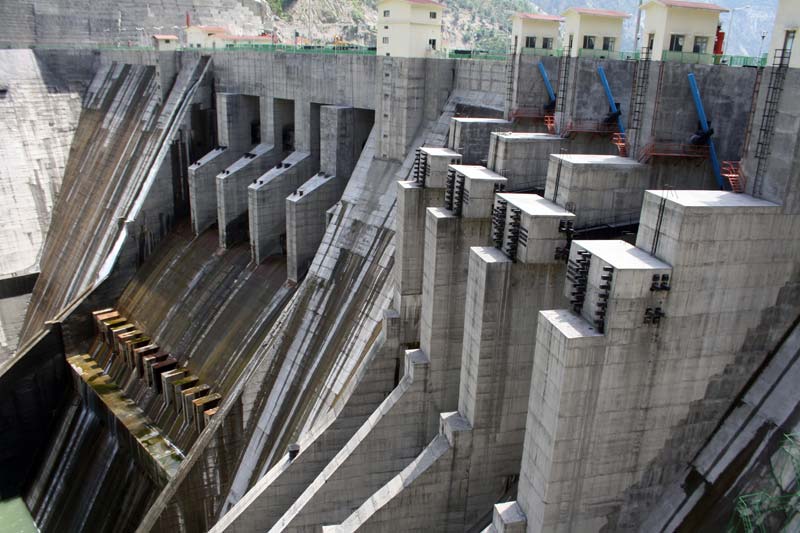by Dr Junaid Jazib
Making the earth and its atmosphere gleam with life, a plant grows from a seed to a canopy so silently and peacefully that no one can outwardly notice its growth with a naked eye. An aggregation of trees means shade, shelter and climate amelioration. Trees bind the atmosphere, earth and hydrosphere in a single complex that forms the life support system on the blue planet.

Peace is the essence of the universe. It connotes a state of orderliness, integrity and harmony. Every constituent of the physical world, from an electron to ever-expanding galaxies, exists and functions subserviently to maintain peace and, thereby, harmony and stability in the cosmos. Peace binds components into a systemised whole. It is the ecological balance that represents this universal peace on the earth. The ecological health of the planet indicates the degree of peacefulness its biophysical systems are capable to maintain.
For humanity to survive and progress, peace is simply indispensable. Humans need not only to be at peace with the external natural world but also require establishing harmony and amicability among themselves.
Contemporary human society, however, lacks nothing except peace and unanimity. In fact, it is the conflicts, violence and wars that characterise humanity today.
Ecological Wrongs
Ecological wrongs, more often than not, lie at the base of the disputes and controversies threatening world peace. Chaos in the natural world is bound to reflect in the human world and vice versa. Environmental crises of varied nature echo in human society as controversies, conflicts and even wars. Conflicting claims over natural resources (such as land, water, mineral, floral wealth, wildlife, etc.), economic disparities, poverty, smuggling, unemployment, inequality, human sufferings, pollution, climate change-related migrations, trade, pollution, physical and mental health issues, Are the factors behind the feuds consuming nothing less than the global peace.

Seemingly socio-political in their origin, most of the regional, national or transnational controversies are rooted in environmental degradation. Political discussions ignoring the environmental linkages of the problems cannot offer sustainable solutions to such issues. They deserve sincere attention essentially involving the required ecological wisdom and the environmental corrections to get just and appropriate solutions, which can substantively contribute to world peace.
The environmental perspective seeks to prepare humans for global citizenship, of course, without impairing or discrediting the national identities. Employing ecological wisdom in dealing with human conflicts essentially involves and offers workable sustainable options which certainly help to address the existing problem as well as saving the earth from unseen environmental hazards. A serene and healthy environment is nothing but an assurance of a peaceful human society.
Planting Trees
Addressing an environmental issue is, per se, a step towards building peace. Planting trees, for example, offers a panacea for a multitude of human sufferings and conflicts endangering peace. A tree symbolises life, peace, progress, energy and sustainability. Making the earth and its atmosphere gleam with life, a plant grows from a seed to a canopy so silently and peacefully that no one can outwardly notice its growth with a naked eye. An aggregation of trees means shade, shelter and climate amelioration. Trees bind the atmosphere, earth and hydrosphere in a single complex that forms the life support system on the blue planet.
Constituting the pivotal role in the ecosphere, trees harvest the solar energy rendering it available for all other forms of life on the earth. It supplies oxygen and reduces carbon dioxide. Life revolves around trees. Human civilisation bloomed and flourished among trees. Food, shelter, clothing, medicine, firewood, timber, leisure, luxuries, industry, etc. are unimaginable without trees.

Trees help clean the air we breathe, filter the water we drink and provide habitat to over 80% of the world’s terrestrial biodiversity. They, especially in an urban environment, absorb pollutants like nitrogen oxides, ozone, carbon monoxide, dust and smoke. Acting as important carbon sinks, trees offset the effects of climate change. Through their crucial role in the hydrological cycle, trees enhance soil productivity and reduce the intensity and frequency of droughts and floods. Forests provide jobs to over 1.6 billion people and shelter to millions of others. Plants are the key ingredients in more than 25% of all medicines. A good deal of the human population draws their sustenance from forests in the form of food or employment.
Why Trees Are Vital?
A landscape abounded with the floral grandeur refreshes the eyes and the troubled minds alike. Those having contracted the negativity, despair and anxiety find a cure for themselves in spending time among trees. Studies confirm that hospital patients with rooms overlooking trees recover faster than others deprived of such an amenity.
Trees provide us with our material requirements, spiritual fulfilment, psychological stability, wisdom and inspiration- all constituting a prerequisite for a healthy life. The physical and mental health of individuals, obviously connected in an intricate manner with plants and forests, is fundamental for a peaceful social atmosphere. By playing a pivotal role in poverty alleviation, bringing social justice and removing economic disparities, contribute to building an amicable social atmosphere.

Trees on the earth’s surface mean Oxygen, energy, water, purity, stability, employment, health, peace and life. Absence or dearth of trees means mess, pollution, sickness, drought, instability and death. The role plants play in the ecosphere is phenomenal in building and maintaining a peaceful human society. Peace on earth bereft of its green cover is unimaginable.
Peace, in its ecological as well as socio-cultural descriptions, is crucial for humanity to survive and keep the earth habitable. Although peace makes an intrinsic character of the biophysical systems on the planet, it stands seriously threatened at present due to undue human interference in nature. Peace is missing in human society too. Disturbances in the natural world deeply and directly impact humanity. The most effective approach humanity needs to adopt for achieving global peace is to allow nature to restore its peacefulness.
(Author heads the Environmental Sciences department at the Government Post-Graduate College, Rajouri. The opinions expressed in this article are those of the author’s and do not purport to reflect the opinions or views of Kashmir Life.)















